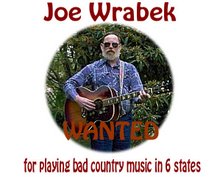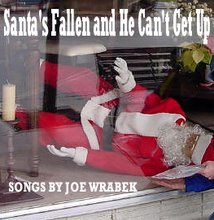Back at the Squirrel House, with a lot of work to do. Gone two weeks, and the lawn’s two feet high again, and the blackberries are coming back. I lose two days from house work this coming week, because Falls City is calling me back for another interview (hopeful sign) and I’m moving my daughter into her dorm. And I still have the kitchen sink to replace (which I have been procfrastinating about).
First task on getting back to the recording equipment was to record “21 Steamer Drive” and “When They Die, I Put Them in the Cookies.” Both came out decent. On both, I’ve got the guitar doing three things—a standard rhythm, plinks on the upper end of the high strings, and bass runs on the low strings. I think this is becoming a standard pattern as long as I’m forced to work alone. I used the acoustic guitar for everything on “21 Steamer Drive,” but used the Strat for the fancy stuff on “When They Die”—it’s easier to do lead work high up on that long, long neck, because your fingers can move faster when the frets are closer together.
I have another new song, currently getting peer review over at Just Plain Folks; I’ll record it after I see whether anybody recommends any changes to the lyrics. This one tackles a serious issue—pollution—in “traditional Joe” fashion, with a bouncy, fast-moving, happy-sounding beat. If I have a serious message to convey, I want to get the listeners’ feet moving first; with luck, their hearts and minds will follow.
Hight (tentatively) “Dead Fishes.” (Audiences, when they hear it, may come up with a better titie.) And here’s how we got there. I am always interested in where inspiration comes from, because mine almost always comes from outside. In this case, it was another challenge: a lyricist I know had asked folks to build a song around a couple of couplets he’d written. Very Elizabethan-type stuff, with rural imagery of plowman in the field watching crops grow and waiting for his reward in Heaven, and it reminded me I had wanted a long time ago to set some of Henry VIII’s poetry to music. (“Hank the Wife-Slayer,” as he’s known in literary circles, was actually quite a good poet.)
I had an Elizabethan-style chorus by the time I finished the next long drive in the car. My “plowman,” though, is dead; the story’s told by his grandson, a young kid, growing up in a landscape that doesn’t grow anything, but that’s all he knows, wondering what grandpa was so concerned about (and also wondering why the fish are dying). There’s some memories of my own childhood in there, too; Syracuse, New York, a middling-size industrialized city, was a lot like that, with brightly-colored creeks and landscapes that looked positively alien (there was even a local lake that would dissolve the bottoms of metal boats). And my grandfather had a farm (not close to town), and I spent a lot of summers there.
The “challenge” couplets didn’t fit the music by the time I was done (and it’s the music that drives these things), but I incorporated as much of the imagery as I could. The result, I think, is “Elizabethan bluegrass”—Elizabethan because of the lyrics, and bluegrass because of the music. I could see a band performing this with 16th-century instruments—and I do know some people who play those instruments, but they’re all in Ashland (over 300 miles away) and while I’ll be seeing some of them in two weeks, I probably need to record the song now. The melody’s too catchy, and I have to clear my head for other things. It may be possible to do an “authentic” version later.
And we’ll see what people think. I think this could work a lot like the anti-war song, “No Good Songs About the War,” in that the sentiments are a little unexpected, though the sound is the same, and if you were used to my material, it might make you think. (The goal of all the songs is to get people to think.) I’m not sure how well that works for somebody who isn’t familiar with the “traditional Joe” stuff. I hope it doesn’t come across as just another social-issues rant. There are plenty of those out there, and I don’t need to be adding to the total.
And it is about dead animals, after all—fish, in this case. In fact, I can probably introduce the song by just saying, “And this one’s about dead fishes…”
Joe
WELCOME...
This blog is the outgrowth of a songwriting workshop I conducted at the 2006 "Moograss" Bluegrass Festival in Tillamook, Oregon. It presumes that after 30-odd years of writing and playing music, I might have something to contribute that others might take advantage of. If not, it may be at least a record of an entertaining journey, and a list of mistakes others may be able to avoid repeating.
This blog is intended to be updated weekly. In addition to discussions about WRITING, it will discuss PROMOTION--perhaps the biggest challenge for a writer today--as well as provide UPDATES on continuing PROJECTS, dates and venues for CONCERTS as they happen, how and where to get THE LATEST CD, the LINKS to sites where LATEST SONGS are posted, and a way to E-MAIL ME if you've a mind to.
Not all these features will show up right away. Like songwriting itself, this is a work in progress. What isn't here now will be here eventually. Thank you for your interest and your support.
Subscribe to:
Post Comments (Atom)



No comments:
Post a Comment